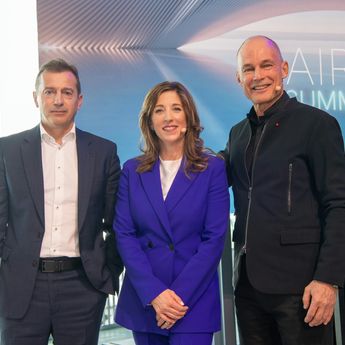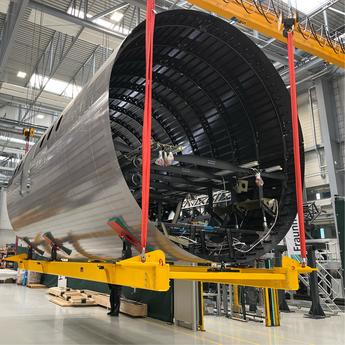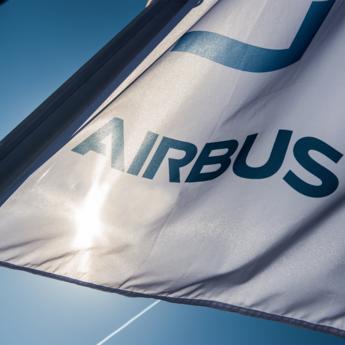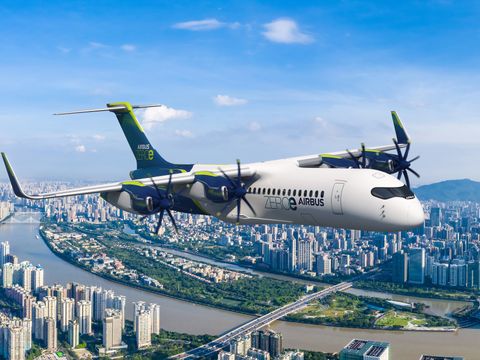A clear commitment
At Airbus, we believe meaningful reductions in carbon emissions are within reach. As the first aircraft manufacturer to set emission reduction targets for our products in operation (Scope 3), we are committed to reducing our carbon footprint.
What are Scope 3 emissions?
Greenhouse gas emissions are categorised in three ways or 'Scopes’. Where Scopes 1 and 2 address direct emissions from operations and electricity, Scope 3 principally relates to emissions from the goods and services we purchase from suppliers (upstream) and the use of the products we sell (downstream).
To address upstream emissions, our suppliers have a key role to play. Airbus drives its Sustainable Supply Chain Roadmap by working with suppliers to commit to sustainable business practices and assess their sustainability maturity and risks. We also engage with our suppliers directly through associations like the International Aerospace Environmental Group (IAEG).
Downstream, Scope 3 emissions include the journeys our aircraft undertake during their years of service. The majority of Airbus’ emissions are Scope 3. They are extremely important but also the most challenging to address. Decarbonisation requires not only innovation and the continuous improvement of our products; it also requires industry-wide collaboration to transition to alternative forms of energy and less carbon-intensive fuels.

What is Airbus’ target to reduce Scope 3 emissions?
Airbus has the ambition to reduce greenhouse gas emissions intensity (i.e. CO2 emitted per passenger kilometre) of commercial aircraft in service (downstream) by 46% between 2015 and 2035.
It has been validated by the Science-Based Targets Initiative (SBTi), an independent organisation widely acknowledged as the leading CO2 target-setting and assessment body. This target is in line with the Paris Agreement.
Airbus supports the aviation industry’s ambition of net-zero carbon emissions by 2050, as set by ATAG, IATA and ICAO.
What is Airbus doing to reduce Scope 3 emissions?
To accelerate the aviation industry’s emissions reduction journey, we are pioneering disruptive technologies, low-carbon solutions and fuel-efficient products. As of 2024, our efforts had reduced the scope 3 emissions intensity of our products by 31% since 2015.
Making progress
Improving fuel efficiency of today’s fleet
The average lifespan of a commercial aircraft is more than 20 years. That means the majority of aircraft flying today are older, less fuel-efficient models. Since 1990, operational efficiency of aircraft has improved by 54% (ATAG Waypoint 2050). The nearest-term opportunity to significantly reduce emissions is to improve the energy efficiency of today’s fleet.
We're constantly working on improving our aircraft. Our latest generation planes emit 20-30% less CO2 on average compared with the previous generation.
Alongside propulsion, wings are one of the biggest factors in an aircraft’s aerodynamic performance and therefore its fuel efficiency. That’s why we’re exploring novel wing concepts and engine technologies, in addition to modern lightweight materials, so next-generation aircraft can rely more on physics and less on fuel.
Airbus is also at the forefront of innovative Air Traffic Management and flight operation solutions to accelerate the adoption of more energy-efficient flights.
Championing sustainable aviation fuel
For almost a century, aircraft have been fueled by kerosene. Now, sustainable aviation fuels (SAF) have the potential to significantly reduce the aviation industry’s carbon emissions. All Airbus aircraft are already certified to fly with up to 50% SAF and we’re working to bring this up to 100% by the end of decade. This has the potential to reduce lifecycle CO2e emissions by up to 80% on average.
Airbus collaborates with airlines, airports, SAF producers and research institutions around the world to help advance the SAF ecosystem, addressing the policy and regulatory environment and the drivers of supply and demand.
Pioneering innovative technology
Airbus is researching new propulsion technologies to bring the world’s first hydrogen commercial aircraft to market. Currently, we're testing a new prototype as part of our ZEROe concept. This project is bigger than just Airbus, and we're collaborating with other organisations in the industry to make hydrogen fuel a reality.
The latest in sustainability
In the spotlight
-

Stories Sustainability
Airbus Foundation and Solar Impulse Foundation launch call for projects
Airbus Foundation, Solar Impulse Foundation and Space4Good launch call for projects that address nature-based climate resilience. -

Press releases Sustainability
Airbus Foundation joins forces with the Solar Impulse Foundation to boost climate…
-

Stories Innovation
Fantastic thermoplastics
-

Press releases Space
Airbus to build two radiometers for CNES for use on NASA/JAXA international climate…
-

Press releases Sustainability
Airbus to boost sustainable aviation fuel production through investment in LanzaJet




